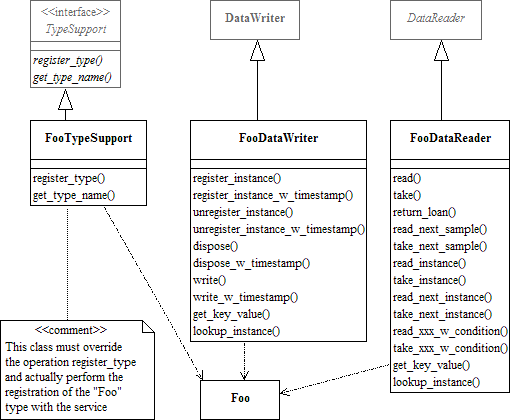Defines generic classes and macros to support user data types. More...
Classes | |
| struct | DDS::InstanceHandle_t |
| Type definition for an instance handle. More... | |
| class | DDS::InstanceHandleSeq |
Instantiates DDS::Sequence < DDS::InstanceHandle_t > . More... | |
| class | DDS::TypeSupport |
| <<interface>> An abstract marker interface that has to be specialized for each concrete user data type that will be used by the application. More... | |
| struct | Foo |
| A representative user-defined data type. More... | |
| class | FooTypeSupport |
| <<interface>> <<generic>> User data type specific interface. More... | |
Variables | |
| static InstanceHandle_t | DDS::InstanceHandle_t::HANDLE_NIL |
| The NIL instance handle. More... | |
Properties | |
| bool | DDS::InstanceHandle_t::is_nil [get] |
| Compare this handle to DDS::InstanceHandle_t::HANDLE_NIL. More... | |
Detailed Description
Defines generic classes and macros to support user data types.
DDS specifies strongly typed interfaces to read and write user data. For each data class defined by the application, there is a number of specialised classes that are required to facilitate the type-safe interaction of the application with RTI Connext.
RTI Connext provides an automatic means to generate all these type-specific classes with the rtiddsgen utility. The complete set of automatic classes created for a hypothetical user data type named Foo are shown below.

Foo The macros defined here declare the strongly typed APIs needed to support an arbitrary user defined data of type Foo.
- See also
- rtiddsgen
Variable Documentation
◆ HANDLE_NIL
|
static |
The NIL instance handle.
Special DDS::InstanceHandle_t value
- See also
- DDS::InstanceHandle_t::is_nil
- Examples:
- HelloWorld_publisher.cpp, and HelloWorld_publisher.cs.
Referenced by RTI.Connext.Queuing.QueueConsumer< TRep >::SendAvailability().
Properties
◆ is_nil
|
get |
Compare this handle to DDS::InstanceHandle_t::HANDLE_NIL.
- Returns
- true if the given instance handle is equal to DDS::InstanceHandle_t::HANDLE_NIL or false otherwise.
- See also
- DDS::InstanceHandle::Equals